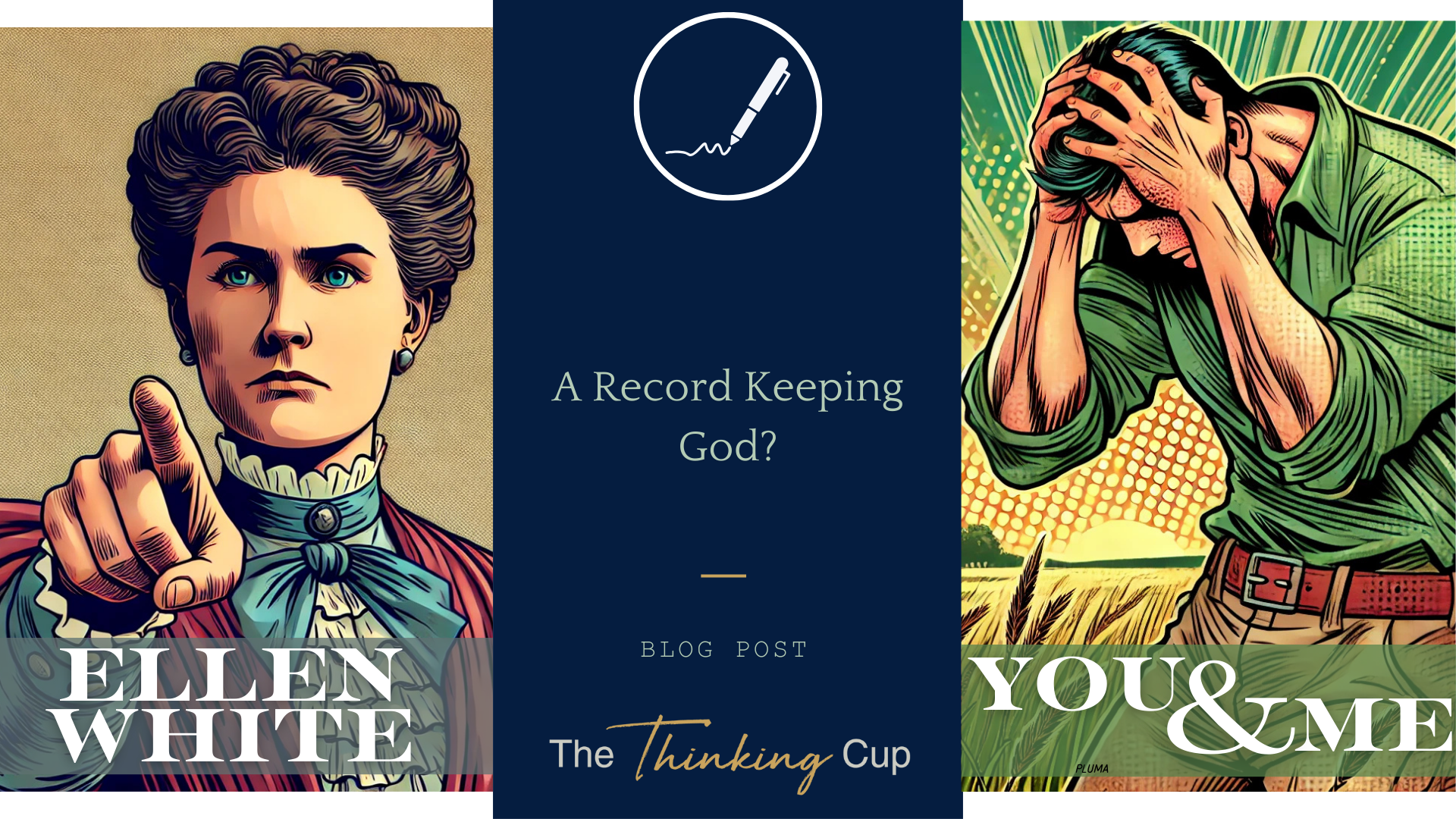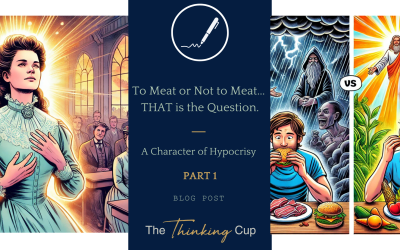Last week at the dinner table, a ‘wait a minute’ moment popped up as our family read, talked, and contemplated day two of our family Advent book. I’m not sure if you have experienced this or not. These are moments when you realize something you have been taught or learned about the Bible or God… isn’t actually Biblical. Maybe a sermon you heard, a statement from a church member, or, in my case, an engrained doctrinal concept that I was born and raised on. Yes, it was a statement from Ellen G. White that caused me to have this ‘wait a minute’ moment with my family.
Juliana, my oldest twin daughter (by 7 minutes), was reading from Psalm 130. She happened to be reading from the New Living Translation (Emphasis Added):
Psalm 130 (NLT)
A song for pilgrims ascending to Jerusalem.
1 From the depths of despair, O Lord,
I call for your help.
2 Hear my cry, O Lord.
Pay attention to my prayer.
3 Lord, if you kept a record of our sins,
who, O Lord, could ever survive?
4 But you offer forgiveness,
that we might learn to fear you.
5 I am counting on the Lord;
yes, I am counting on him.
I have put my hope in his word.
6 I long for the Lord
more than sentries long for the dawn,
yes, more than sentries long for the dawn.
7 O Israel, hope in the Lord;
for with the Lord there is unfailing love.
His redemption overflows.
8 He himself will redeem Israel
from every kind of sin.
After we discussed a few questions, my mind was drawn back to verse 3, and I asked Juliana to reread this verse:
Psalm 130:3 (NLT)
Lord, if you kept a record of our sins,
who, O Lord, could ever survive?
Those of you who are Adventists and many of you who are ‘former’ Adventists may have already caught the Ellen White statements that caused my double take. Here was my ‘wait a minute’ moment. I had been taught through the writings of Ellen White and specific Bible-proof texts that our sins are on record in heaven, and when my name comes up in the judgment, if I haven’t confessed ALL sins, my name would be wiped out of the Book of Life. My soul’s existence would be eradicated because my life didn’t reflect the perfect character of Jesus. My life didn’t vindicate the character of God because there was still sin on my record.
Since leaving the Adventist church, I have constantly found myself asking, “Is this in the Bible? Or is this something the Ellen White said?” So the following day, I searched through the digital stacks of Ellen White books on my Logos Bible Study Software. I wasn’t surprised at all to find the following completely unbiblical and, quite frankly, heretical statement in one of her pinnacle literary works, The Great Controversy, a fictional commentary on who Ellen White thought God was and the ongoing battle between Satan and Jesus: (Emphasis applied)
“As the books of record are opened in the Judgment, the lives of all who have believed on Jesus come in review before God. Beginning with those who first lived upon the earth, our Advocate presents the cases of each successive generation, and closes with the living. Every name is mentioned, every case closely investigated. Names are accepted, names rejected. When any have sins remaining upon the books of record, unrepented of and unforgiven, their names will be blotted out of the book of life, and the record of their good deeds will be erased from the book of God’s remembrance. The Lord declared to Moses, “Whosoever hath sinned against me, him will I blot out of my book.” ” [Exodus 32:33.] [1]
In fact, she makes it very clear that EVERY act you have ever made, every temptation, and every sin is recorded. However, notice that the only items that remain in the ‘Book of Remembrance’ are the acts that vindicate the character of God. If any act is considered unrighteousness, these must be wiped out, and if you haven’t asked for forgiveness for these unrighteous actions when being investigated… well then… you don’t deserve to be in heaven; therefore, your name is blotted out!
“In the book of God’s remembrance every deed of righteousness is immortalized. There every temptation resisted, every evil overcome, every word of tender pity expressed, is faithfully chronicled. And every act of sacrifice, every suffering and sorrow endured for Christ’s sake, is recorded.” [2]
It is no wonder that many of my former Adventist friends deal with different forms of spiritual abuse, PTSD, emotional trauma, and many other forms of theological mistreatment at the hands of the doctrines and statements of Ellen White and the Adventist church.
The Psalmist of Psalm 130 would disagree with the ramblings of Ellen White. King David, the attributed author of Psalm 130, suggests the opposite. He poses a question that, when answered correctly, gives us insight into the very nature of God:
Psalm 130:3 (NLT)
Lord, if you kept a record of our sins,
who, O Lord, could ever survive?
If God indeed did keep a record of our sins, who could survive? The answer is clear for David: ABSOLUTELY NO ONE. If God kept a record of our sins, no one could stand against that. The opposite holds. Then it is clear: God DOESN’T keep a record of our sins!
I know that someone reading this blog will immediately turn to places in the Bible where the Book of Remembrance is discussed or even the books being opened in Revelation. While this isn’t the place to delve into a deep study on this topic, I want to stress one thought.
If the Christ event solved the sin problem, allowing the forgiveness of ALL sins, I accept Jesus as my Savior. Placing my allegiance in Him. Then why would my own shortcomings judge me if Jesus’ perfect sacrifice pays the penalty that I deserve as a sinner? Does God remember my sins if I accept Jesus as my Savior? Is God an exacting God that records all of my sins…unless, of course, I ask forgiveness for them. So what happens if I don’t remember a sin committed or don’t even understand a sin I’ve committed… failing to ask forgiveness for it? As a committed believer and follower of Jesus Christ, am I still condemned by this sin?
While this topic will be explored in greater depth, in other articles, I want to honor the biblical text of Psalm 130 and try to uncover what King David intended through this song.
A Journey from Despair to Hope
Psalm 130 invites us to reflect deeply on life’s most challenging moments. The word depths (מַּעֲמַקִּ֖ים), in verse 1, serves as a powerful metaphor for the trials that push us to the brink—moments of profound pain, spiritual desolation, and even the weight of our own failures. Yet, even in these depths, the psalmist offers us hope. His cry is not one of absolute despair but a plea made with the knowledge that God is forgiving and does not keep a record of sins.
When we feel utterly lost in our darkest times, we can trust that God meets us there. He joins us in our struggles, not as a distant observer but as one who cries out alongside us. This profound truth finds an echo in Jesus’s use of Psalm 22:1 on the cross and in the poetic insight of George MacDonald:
“Never a cry of love went forth from human heart but it found some heavenly chord to fold it in.” [3]
Dispelling Misconceptions About God
As we delve further into the psalm, it’s essential to address a common misconception: the idea that God is eagerly keeping track of our sins, waiting for us to stumble. The psalmist refutes this in verse 3:
Psalm 130:3 (NET)
“If you, O Lord, were to keep track of sins,
O Lord, who could stand before you?”
This erroneous view, also reflected in Job’s lament (“What is mankind that you make so much of them…?” Job 7:17–18), paints a picture of a vindictive deity—one who tests and punishes relentlessly. But this is far from the truth. The God revealed in Scripture is not a harsh judge tallying our mistakes but a loving and forgiving Creator.
Forgiveness as God’s Essence
The heart of the psalm shines in verses 3 and 4:
Psalm 130:3–4 (ESV)
If you, O Lord, should mark iniquities,
O Lord, who could stand?
But with you there is forgiveness,
that you may be feared.
The Hebrew text emphasizes that forgiveness and steadfast love are integral to God’s very nature. These qualities echo the New Testament declaration that “God is love” (1 John 4:8).
Confident in this truth, the psalmist finds solid ground in God’s grace and declares:
Psalm 130:5 (ESV)
I wait for the Lord, my soul waits,
and in his word I hope;
The pairing of wait and hope reflects an active, expectant faith—one that trusts in God’s character of forgiveness and unfailing love. This hope is certain, like the anticipation of dawn after a long night.
The Morning of Redemption
The psalm closes with a vision of renewal. As the King James Version eloquently puts it, God offers “plenteous redemption.” The long night of guilt and anxiety gives way to the bright morning of forgiveness and love. We wait not in vain but in the assurance that the God who hears our prayers is faithful to redeem us.
Rest well in knowing this truth. God is NOT a god described by Ellen White, exacting and a record-keeper of all those evil deeds we all do as sinful humans. Our sins are forgiven because Jesus is our forever mediator! We wait for our Lord, knowing that His character is one of love and forgiveness, NOT meticulous record-keeping of where we all fall so desperately short!
In Christian Love,

[1] Ellen Gould White, The Great Controversy Between Christ and Satan; Great Controversy (Pacific Press Publishing Association, 1888), 483.
[2] Ellen Gould White, The Great Controversy Between Christ and Satan; Great Controversy (Pacific Press Publishing Association, 1888), 481.
[3] “Paul Faber, Surgeon by George MacDonald: Chapter 7.”




0 Comments